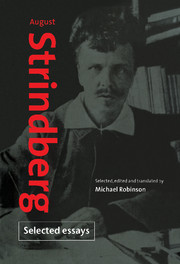Book contents
- Frontmatter
- Contents
- Notes on the text
- Introduction
- from Vivisections (1887)
- ‘On Modern Drama and Modern Theatre’ (1889)
- from Vivisections II (1894)
- ‘Césarine’ (1894)
- ‘Deranged Sensations’ (1894)
- ‘In the Cemetery’ (1896)
- from Jardin des Plantes (1896)
- ‘Introduction’
- ‘The Death's Head Moth’
- ‘Indigo and the Line of Copper’
- ‘To the Heckler’
- ‘On the Action of Light in Photography’ (1896)
- ‘A Glance into Space’ (1896)
- ‘Edvard Munch's Exhibition’ (1896)
- ‘The Synthesis of Gold’ (1896)
- ‘Contemporary Gold-Making’ (1896)
- ‘The Sunflower’ (1896)
- ‘The Mysticism of World History’ (1903)
- ‘August Strindberg on Himself’ (1909)
- Notes and commentary
- Index
‘Indigo and the Line of Copper’
or The Unity of Matter Confirmed by Berzelius, who was an Alchemist
Published online by Cambridge University Press: 18 December 2009
- Frontmatter
- Contents
- Notes on the text
- Introduction
- from Vivisections (1887)
- ‘On Modern Drama and Modern Theatre’ (1889)
- from Vivisections II (1894)
- ‘Césarine’ (1894)
- ‘Deranged Sensations’ (1894)
- ‘In the Cemetery’ (1896)
- from Jardin des Plantes (1896)
- ‘Introduction’
- ‘The Death's Head Moth’
- ‘Indigo and the Line of Copper’
- ‘To the Heckler’
- ‘On the Action of Light in Photography’ (1896)
- ‘A Glance into Space’ (1896)
- ‘Edvard Munch's Exhibition’ (1896)
- ‘The Synthesis of Gold’ (1896)
- ‘Contemporary Gold-Making’ (1896)
- ‘The Sunflower’ (1896)
- ‘The Mysticism of World History’ (1903)
- ‘August Strindberg on Himself’ (1909)
- Notes and commentary
- Index
Summary
For the last year I have taken my morning walk in the Cemetery of Montparnasse. Right from the start, whenever there was moisture in the air, I noticed on returning home an unpleasant taste of verdigris in my mouth, which remained with me during the morning for at least a couple of hours. As the taste of verdigris did not appear when I forwent my walk in the cemetery, I concluded that it had been occasioned by the miasmas of the dead. And when mild toxic symptoms resembling those of a cupric salt also appeared, I began to wonder if it really was copper. One morning I therefore took along a bottle of ammonia, expecting to obtain a shade of blue which is, of course, characteristic where solutions of cupric salts are concerned, but it did not materialise. I had with me some lead acetate and within half an hour I obtained a small amount of black lead sulphide and a little carbonate. An old textbook on poison had recently come my way, in which I had read about Raspail's epoch-making appearance in a celebrated trial for murder by poison, where he warned against placing too great a confidence in chemical analyses, when the unexplained capacity of the reactive agent to participate in the new formation of the element that is being sought may often lead to a synthesis. In the course of the discussion there was also a report about the occurrence of copper in the human body when it has not been introduced by chance or with criminal intent.
- Type
- Chapter
- Information
- August Strindberg: Selected Essays , pp. 155 - 158Publisher: Cambridge University PressPrint publication year: 1996



